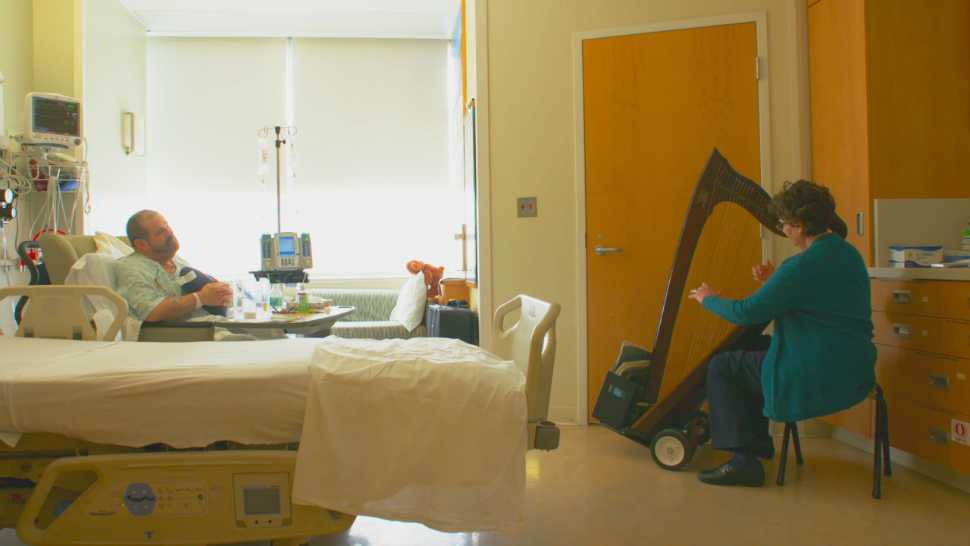John Tolley, March 12, 2017
Georgiann Ziegler spends a lot of time in the hospital.
Nearly 50-100 days out of every year to be more precise.
So it?s important to her to live as fulfilling a life when she?s in the hospital as when she?s at home.
That, in a nutshell, is what makes the University of Michigan Medicine?s Gifts of Art program so crucial to the patients - and staff – it serves.
?Gifts of Art has allowed me to have the opportunity to feel whole as I?m staying in the hospital,? says Ziegler. ?I feel like I can do the things that I could do when I?m not in the hospital. It doesn?t cure my disease, but it definitely makes it much more manageable.?
Operating throughout the University of Michigan?s network of hospitals and health clinics, Gifts of Art brings both visual art and music into spaces most beneficial to patients. But, program director Elaine Sims explains, it?s more than just a way to enhance the ambience.
?We do this to calm, comfort, support and [it] assists the healing process,? says Sims. ?What I?ve seen is that when you?re in a hospital, your regular, normal world is stripped away and you?re in a very primal, vulnerable space. Art is a primal, basic survival skill.?
To facilitate that healing, Gifts of Art interacts with patients in a number of different ways, both in large and intimate settings. These include:
Public Performances: The main lobby of the University?s hospital becomes a concert hall for patients, staff and visitors alike. Outfitted with a baby grand piano, performances in music, theatre and dance offer a welcome respite in the middle of what can be a daunting environment.
Bedside Art: When patients can?t leave their rooms, the world of art comes to them. Artists in Residence provide both stimulation and distraction through a variety of kits that allow the patient to create their own. From journaling to bead work to origami, Bedside Art works to keep the brain active while the body heals.
Art Galleries: The nine galleries of the Michigan Medicine system are visited by nearly 10,000 people every day. Among non-museum spaces, this makes them some of the busiest galleries in the state. Exhibits showcase both regional art and works emblematic of the setting, and often display pieces by the employees of the hospital and various clinics. If ambulatory, patients are encouraged to gain strength and peace of mind by through a gallery visit.
Art Cart: Patients are afforded a sense of control via the Art Cart, a roving library of visual art that lets them choose which works will adorn their room throughout their treatment and recovery.
Bedside Music: Melody and rhythm can both sooth and stimulate patients, and certified Music Practitioners are available to bring a performance where it is needed most. The tension and fear that can arise when a person enters a hospital can have a detrimental effect on the spirit and body. The Bedside Music program presents simple songs as a panacea for the patient?s peace of mind.
Friends Meditation Garden: Hospitals throughout history have included gardens that connect patients with the natural world. The University of Michigan hospital?s garden is a quiet spot of seclusion for those giving and those receiving treatment. Centered on a fountain that provides comforting sounds, the garden is meant to evoke the energy and continuous growth of life.
Clearly, Gifts of Art is an extensive and multifaceted program. (Did we mention they even have their own orchestra composed entirely of Michigan Medicine faculty, staff and students?)
The program stands as a paragon to others like it nationwide. According to Sims, Gifts of Art has been recognized by the National Endowment of the Arts as a model program in the arts in healthcare field, and has helped jumpstart and mentor similar program nationwide.
For Sims, though, Gifts of Art will always be about the humanity that?s stirred by the patients? contact with art in its various forms.
?They come here with fear and trepidation,? says Sims. ?We?re not miracle workers, but we bring them things that are human scale and help ground them back into their sense of self and provide them some comfort.?







 Check out what's coming up next live on B1G+.
Check out what's coming up next live on B1G+. 